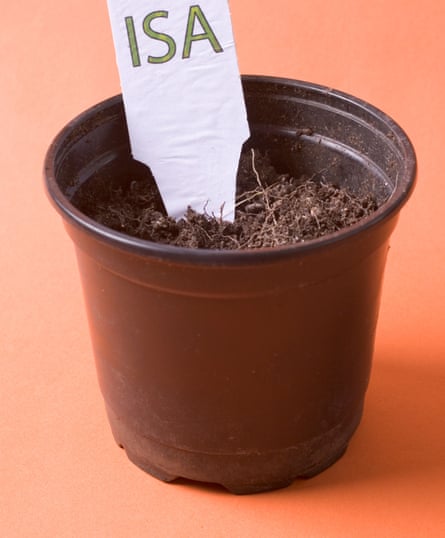The government’s offer of free cash towards buying your first home prompted huge numbers of people to sign up for a help-to-buy Isa. However, it has emerged that hundreds of thousands of these savings accounts are sitting there with no money in them, waiting to be brought back to life.
It seems that many of those who opened a help-to-buy Isa have forgotten they have one. Or perhaps have been meaning to pay some money in but have still not got round to it.
Nationwide building society – one of the leading providers – has revealed to Guardian Money that in the final month before the scheme closed to new applicants n 2019, about 410,000 help-to-buy Isa accounts were opened, with 80% of those snapped up in the final week.
Lockdown savings? Put them in an Isa while you canRead more
While many people did put some money in straight away or later, you could open a help-to-buy Isa without depositing any cash, and of those 410,000 accounts, about 270,000 were opened that way and still have no money in them.
More than 20 banks and building societies were offering these accounts, so if the same is going on across providers, there could be a million or more forgotten Isas out there.
However, the good news is that those who signed up have plenty of time to make the most of their account.
The help-to-buy Isa was launched in late 2015 and aimed at those saving up to buy their first home. The big financial “carrot” with this account is that the government will give you up to £3,000 to boost your savings, with only a few strings attached.
The Isas were popular right from the start, and by late February 2019, 1.4m had been opened. However, it was the announcement that they were being withdrawn from sale at the end of November that year that sparked a huge increase in applications as people rushed to grab one before they disappeared.
 View image in fullscreenWith the help-to-buy Isa, the government will give you up to £3,000 to boost your savings, with only a few strings attached. Photograph: Chris Batson/Alamy
View image in fullscreenWith the help-to-buy Isa, the government will give you up to £3,000 to boost your savings, with only a few strings attached. Photograph: Chris Batson/Alamy
In the run-up to the scheme closing to new savers, there were a number of articles in the press saying that time was running out if you had not taken advantage of the offer. A big plus was that, provided you signed up before 1 December 2019, you could continue tucking away money for another 10 years.
As Guardian Money wrote at the time: “If you or your offspring are over 16 and have never owned a home but may well want to in the future, you might want to reserve your spot by signing up now. You can open an account with as little as £1 [or without depositing any money in some cases] and don’t have to pay in every month, so some might say it’s a no-brainer to grab one now before they are withdrawn from sale.”
If you have an account, you can keep saving into it until 30 November 2029, when it will close to additional contributions. You then have until 1 December 2030 to claim the bonus, which is only paid once it is certain the property purchase will go ahead – your solicitor or conveyancer will claim the bonus between exchange and completion.
The bonus will boost your savings by 25%. So for every £200 saved, first-time buyers can receive £50.
You can save up to £200 a month, although in the first month you can deposit a lump sum of up to £1,200. Nationwide explains that if you opened your account without depositing any money, you can still pay in a total of up to £1,200 during the first calendar month you use it.
The minimum government bonus is £400. That means you need to have saved at least £1,600 into your Isa before you can claim. The maximum government cash you can receive is £3,000. To get that, you need to have saved £12,000.
The amount you save every month is up to you, as long as you don’t go over £200
To qualify, the property you buy must be in the UK and cost up to £250,000 outside London or up to £450,000 in the capital. It must be your only home and it cannot be rented out or used as a holiday home. However, the government will not claw back bonuses from people whose circumstances change after they buy, and who need to rent out their property as a result.
The amount you save every month is up to you, as long as you do not go over £200. However, you cannot roll over your allowance.
You can withdraw money from your account at any time.
Nationwide has about 630,000 help-to-buy Isa accounts and thinks that a combination of a good rate, the account being open to savers right until the end and a number of mentions in the media all contributed to its popularity. The account currently pays 1% interest.
Can you transfer a help-to-buy Isa?
 View image in fullscreenNationwide building society says that in the final month before the scheme closed to new applicants, about 410,000 help-to-buy Isa accounts were opened. Photograph: Joe Giddens/PA
View image in fullscreenNationwide building society says that in the final month before the scheme closed to new applicants, about 410,000 help-to-buy Isa accounts were opened. Photograph: Joe Giddens/PA
If you have a help-to-buy Isa, you don’t have to stick with your existing provider. You can transfer it to another bank or building society if you want – for example, to one that is paying a better interest rate.
One of those that accepts transfers in and is offering a decent rate is HSBC, although you need to hold its Flexible Saver, Premier Savings or current account. It is currently paying 1.75% on balances up to £12,000.
Newcastle building society is also letting people transfer their help-to-buy Isa over to it from another provider. It currently offers a good rate: 1.64%. However, in order to make the switch, you have to visit one of its branches.
Another option for those looking for a new home for their cash is Halifax. At the moment it is paying 1% on savings up to £12,000.
Individuals are also allowed to transfer the funds in their help-to-buy Isa over to a lifetime Isa, which lets people save for either a property or retirement. You can put away up to £4,000 each year until you are 50 and the government will add a 25% bonus to your savings, up to a maximum of £1,000 a year. To open one you must be aged 18-39. Any funds you transfer over will count towards the £4,000 annual limit for the lifetime Isa, and therefore cannot exceed this figure.




